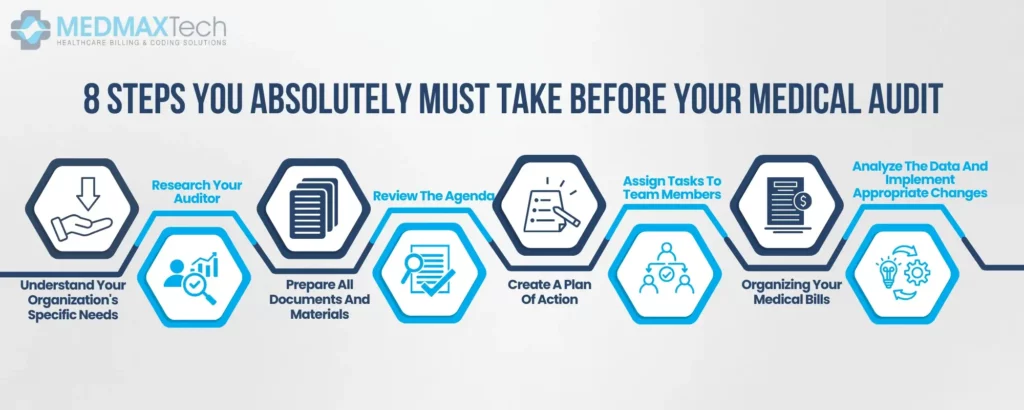
Pre-Audit Preparation: 8 Steps You Absolutely Must Take Before Your Mental Health Medical Audit
Audits can be a stressful and anxiety-inducing experience, especially if you are not prepared. Medical audits are performed to ensure compliance with policies and procedures and improve the quality of care.
The medical audit is a process whereby a healthcare organization’s records are reviewed to verify the accuracy of medical billing companies and coding. The Centers may conduct the audit for Medicare & Medicaid Services (CMS), a state Medicaid agency, a commercial payer, or an accreditation or certification body.
A medical audit can significantly impact a healthcare organization’s revenue. For this reason, healthcare organizations need to take steps to prepare for a medical audit. Pre-audit preparation is essential to a successful audit.
This blog post will give you 8 steps you must take before your medical audit. Following these steps can ensure a successful audit and peace of mind.
8 Steps You Absolutely Must Take Before Your Medical Audit
Understand Your Organization's Specific Needs
The first step in conducting a successful medical audit is understanding your organization’s specific needs. Every medical organization is different, and each one has its own unique set of challenges and opportunities. By taking the time to understand your organization’s specific needs, you can tailor your audit to focus on the areas that are most important to your organization.
In addition to understanding your organization’s specific needs, you must also clearly understand the audit process itself. The audit process can be complex, and it is important to understand how it works before you begin clearly. There are a variety of resources available to help you learn about the audit process, and it is important to take advantage of these resources before you begin your audit.
Research Your Auditor
The CMS behavioral health documentation requirements are subject to state and federal regulations. The organization’s medical staff must adhere to these regulations when caring for patients. If an organization is out of compliance with these regulations, it may be subject to a medical audit.
As such, organizations need to research their auditor before their medical audit. This will help the organization understand the auditor’s process and expectations. Additionally, research may reveal any potential areas of concern that the organization can work to improve before the audit.
Researching your auditor before your medical audit can help ensure a successful audit and avoid potential penalties.
Prepare All Documents And Materials
Organizations should take the time to prepare all documents and materials before their medical audit. This will help ensure that the audit goes smoothly and that all required information is gathered.
Some of the things that should be gathered before the audit include the following:
- A list of all employees and their job titles
- A description of the organization’s structure
- The organization’s policies and procedures
- Copies of all medical records
- Medical Payment records
- Insurance information
Organizations should also ensure a representative is available to answer any questions during the audit. This person should be knowledgeable about the organization’s medical practices and be able to provide any additional information that may be needed.
Review The Agenda
It is generally accepted that medical organizations must take certain steps or an agenda before their medical audit. By taking these steps, the organization can be better prepared for the audit and avoid any medical potential issues. A few different agendas are typically followed, but the most common one is the “Pre-Audit Agenda.” This agenda typically includes the following steps:
- Appoint an Audit Committee
- Select the External Audit Firm
- Notify Staff of the Audit
- Prepare the Audit Plan
- Collect and Review Relevant Documents
- Schedule the Audit
- Conduct the Audit
- Prepare the Audit Report
- Implement the Audit Recommendations
Create A Plan Of Action
Top Medical health Companies must take several steps before their medical audit to ensure a successful outcome. These steps include:
- You will want to create a “point of contact” list. This should include the names and titles of individuals within the organization who will be responsible for each area of the medical audit.
- Next, you will want to create a list of medical records required for the audit. This should include both active and inactive files.
- Once you have your records in order, you will need to create a list of questions you would like answered during the audit. This list should be specific and tailored to the needs of your organization.
- Finally, you will want to create a timeline for the medical audit. This timeline should include when the audit will begin, when it ends, and any deadlines that must be met along the way.
By taking these steps, medical organizations can prepare for their medical audit and give themselves the best chance for a successful outcome.
Assign Tasks To Team Members
Medical organizations must take several steps before their mental health medical audit to ensure a successful outcome. These steps include:
- Reviewing your organization’s current policies and procedures
- conducting a risk assessment
- developing an audit plan
- creating a communication plan
- assigning roles and responsibilities
- conducting the audit
- debriefing with stakeholders
- drafting and issuing the report
- following up after the audit.
Organizing Your Medical Bills
As a medical professional, you likely receive a lot of medical bills. Some of these may be for your care, while others may be for the care of your patients. Regardless of the source, medical bills can quickly become overwhelming and difficult to track.
One way to stay organized is to set up a system for medical bill organization. This can be as simple as creating a monthly folder and putting all your bills in that folder. Or, you could create a more complex system with different folders for different types of bills.
Whatever system you choose, the important thing is to be consistent and to stay on top of your medical bills. By doing so, you can avoid any surprises during your next medical audit.
Analyze The Data And Implement Appropriate Changes
The Centers for Medicare and Medicaid Services (CMS) will conduct a medical audit of your organization. This is a critical time for your organization, and it is important to be prepared.
You can do a few things to prepare for the audit and ensure that your organization complies with all CMS regulations. First, you should analyze your data and identify areas where you may be out of compliance.
Once you have identified these areas, you should make the appropriate changes to your policies and procedures. Additionally, you should train your staff on these changes to be prepared to answer any auditors’ questions.
Taking these steps can help your organization avoid any penalties or negative consequences from the audit.
Wrap-Up Discussion!
In conclusion, it is important to take specific steps beforehand to ensure a positive outcome for your medical audit. By pre-auditing your Medical Health Company, assessing your risks, and putting together a detailed action plan, you can set your medical organization up for success.










